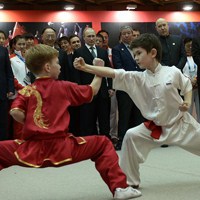The general consensus in the Western media is that the Sochi Olympics have been a diplomatic failure for Russian President Vladimir Putin. If the Winter Games were supposed to be the coming out party for a Russia resurgent two decades after the Soviet collapse, then the deliberate decision by several European and American leaders—including Barack Obama, David Cameron and Francois Hollande—to skip attending the Olympiad in tacit protest of Russian policies, particularly on gay rights, spoiled those plans.
The Russian response has been that the Sochi games have broken all records for the attendance of world leaders at the Winter Games and to suggest a certain degree of what might be termed “Euro-Atlanto-centrism” in the Western media coverage, as if the presence of Western leaders at a global event makes or breaks it. As Richard Weitz noted earlier this week, the leaders of the world’s second- and third-largest economies, Xi Jingping of China and Shinzo Abe of Japan, respectively, were present and took advantage of the games to conduct informal summits with the Russian president. The Russians may even have heaved a sigh of relief that Obama did not attend. Given the intense political pressure in the United States for a complete boycott of Sochi, the president, had he traveled to Sochi, would undoubtedly have publicly lectured Putin for his human rights record—something that would have been seen by the Kremlin as an intolerable humiliation.
Sochi raises an interesting and provocative question as to whether the absence of key Western leaders takes away from the “global” nature of an event. We can categorize the countries whose heads of state and government in attendance at Sochi into several categories. The first is comprised of those that have traditionally shared close cultural and religious ties with Russia: the nations that form part of the “Byzantine Commonwealth,” such as Greece, Serbia, Montenegro, Bulgaria and Romania. Even if many of these states are members of the European Union or NATO, and so adhere to the Euro-Atlantic world, following the lead of Obama or Hollande in snubbing Russia would not be politically or economically feasible for them. Significant portions of their populations are sympathetic with Putin’s stand on social issues, and given the close economic ties these countries enjoy with Russia, aggravating relations with the Kremlin is not worth the cost.

